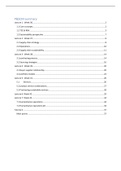Samenvatting
Samenvatting Purchasing and Supply Chain Management, ISBN: 9781138064768 Purchasing & Supply Chain Management (EBB742B05)
- Instelling
- Rijksuniversiteit Groningen (RuG)
Summary of Purchasing & supply chain management given in the pre-master course of Technology & operations management in the 1 semester. The summary is based on the slides given in the lectures supported by the book.
[Meer zien]





